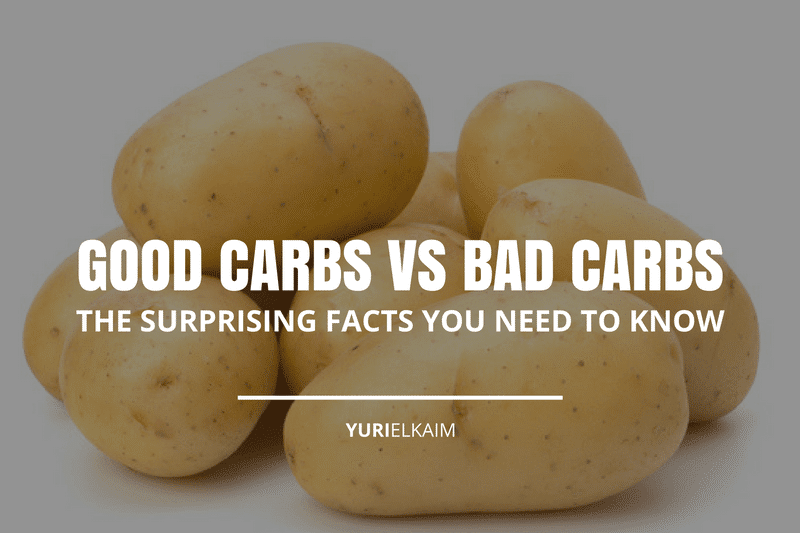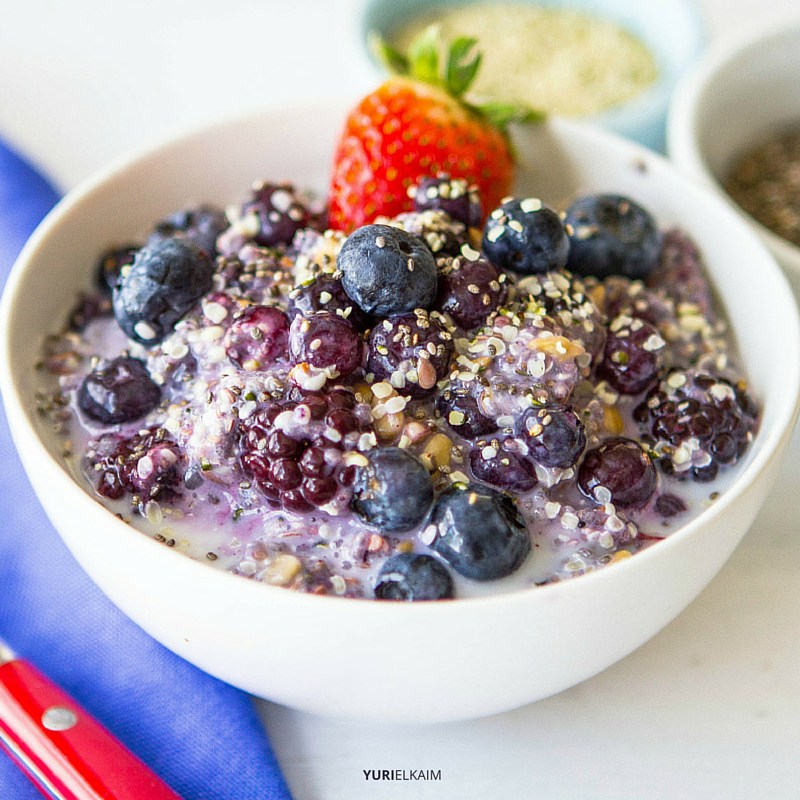Carbs have gotten a bad reputation.
In this article
When we want to shed a few pounds, they’re usually the first thing to go from our diets. And when our pants get a little too tight, we give them all the blame.
The truth is that carbohydrates, like all macronutrients, are an essential part of our diet.
We need carbohydrates to produce glucose, our body’s main source of energy, and to help fuel our brain and muscles. In fact, without an adequate supply of carbohydrates in the diet, our body can start breaking down muscles to convert amino acids into glucose.
Carbohydrates are a necessary part of any healthy diet—especially a fat burning one.
But not all carbohydrates are created equal.
Some carbs can help us feel full, ramp up weight loss, build muscle, and support overall health. Others can spike blood sugar, lead to sluggishness and fatigue, and even make us gain weight.
That’s why it’s important to be choosy when it comes to which carbs you eat.
Good Carbs vs. Bad Carbs
Carbohydrates can be broken down into two categories: complex (“good”) carbs, and simple or refined (“bad”) carbs.
Healthy Breakfast Cereal
Complex carbohydrates are awesome because they contain fiber, which moves slowly through the digestive process. This means you’ll feel fuller longer, as they help cut cravings between meals. They also keep you regular.
This category of carb is also great for weight loss, burning fat, and keeping your blood sugar stable. Plus, they’re nutrient-dense, meaning they contain plenty of vitamins and minerals.
Meanwhile, simple or refined carbs break down quickly into glucose once they’re in the body. This leads to a jolt of sugar in the blood, followed shortly thereafter by a sugar crash. Worst of all, you’ll feel hungry pretty soon after indulging in these bad carbs, so you’ll end up eating even more. Not good.
Simple carbs also don’t have much in the way of vitamins for the number of calories they contain.
As you can probably imagine, refined carbs are found in processed and sugary junk foods, including many desserts, refined grains, and juices.
If a food is high in sugar, that’s a cue that it’s probably a simple, refined carbohydrate.
There’s one important exception in the simple carb category, and it has to do with fruits.
Fruits are considered a simple carbohydrate, but they have the same beneficial nutrients and fiber as complex carbs, which makes them a good carbohydrate. That’s one of the reasons I think smoothies are so good for you.
Instead of giving you a list of carbohydrates to avoid if you want to lose weight (or even a list of carbohydrates to avoid in general), instead, let’s focus on the positive.
I’m going to give you a few of my favorite good carbs that can help trim your waistline and your stomach.
This way, you can fit them into your diet and take advantage of their many health benefits!
Top 7 Good Carbs for Weight Loss
1. Oats
Oats are one of my favorite good carbs when it comes to weight loss. Not only are they versatile, they stand out because of their impressive fiber content and chronic disease-busting powers.
Oats contain a special kind of fiber known as beta-glucan, which has been extensively researched for its many health-promoting properties.
Beta-glucan is especially notable because of its ability to reduce total and LDL (bad) cholesterol. In fact, oat consumption has been associated with a drop of 5 percent and 7 percent in total and LDL cholesterol, respectively (1).
Also, oats help with weight loss because they are full of dietary fiber. One cup of dry oats contains about 8 grams, a pretty significant chunk of what you need in the entire day. This means that oats can help keep you full between meals, leading to decreased calorie intake.
Try this:
2. Legumes
Legumes, including beans and lentils, are an excellent healthy carbohydrate to include in your diet if you’re looking to shed some pounds. Worried about the phytic acid content? Don’t be. Here’s why.
Legumes are low in calories and fat but high in nutrition. They contain plenty of protein, vitamins, and minerals.
Much like fiber, your body digests protein slowly. This keeps you feeling fuller, and longer and it’s just one reason I often recommend including protein-rich foods wherever possible in your diet.
Legumes definitely deliver when it comes to protein: one cup of cooked lentils boasts an impressive 18 grams of protein while a cup of black beans contains 15 grams.
Legumes are also rich in folate, iron, potassium, and phosphorus, making them one of the very best carbohydrates out there.
Try this:
3. Berries
Many people just think of carbohydrates as pasta, rice, and grains without realizing that fruits and veggies are actually carbohydrates too!.
Berries are loaded with healthy antioxidants, especially anthocyanins, which help protect your body and keep chronic conditions at bay.
Plus, berries have a low-glycemic index, so you can satisfy your sweet tooth without skyrocketing your blood sugar. High blood sugar equates to an influx of insulin, and too much insulin can lead your body to store fat.
Berries are the perfect solution to promote weight loss while knocking our sweet cravings. Feel free to enjoy your choice of berries, from strawberries to blueberries and anything in between.
Try this:
4. Quinoa
Quinoa is packed with health benefits, making it one of the best gluten-free grains out there.
Not only is quinoa full of fiber (almost twice as much as other grains), this super grain is also rich in iron, B vitamins, phosphorus, vitamin E, and magnesium (2).
It’s also one of the few plant foods that contain all nine essential amino acids, making it a complete protein.
That’s right – while other plant foods might contain some protein, they often need to be paired with other protein sources to create a complete protein. Quinoa, on the other hand, is able to provide plenty of protein all on its own.
5. Potatoes
This might come as a surprise, but yes, you can enjoy potatoes guilt-free because they are considered a good carbohydrate.
The preparation method is important here, though. Instead of cooking and eating them right away as you might normally do, cooking them and then cooling them in the fridge can help amplify the health benefits by increasing the amount of resistant starch.
This type of starch doesn’t get absorbed into the bloodstream, meaning it doesn’t have any impact on your blood sugar levels.
Plus, the breakdown of resistant starch leads to the production of something called butyric acid. This essentially feeds the good bacteria in your gut, keeping your digestive system happy and even promoting weight loss.
With potatoes, just be mindful of your toppings. A baked potato itself is fine, but loading up on the cheese and butter stacks up the calories fast and diminishes those health benefits.
6. Non-starchy vegetables
Regardless of your weight loss goals, non-starchy vegetables should absolutely be included in your diet.
Although they are lower in carbohydrates than their starchy counterparts, I consider non-starchy vegetables to be one of the best sources of “good” carbohydrates out there.
Non-starchy vegetables, which include veggies like leafy greens, broccoli, peppers, cucumbers, mushrooms, and celery, are low in calories and high in fiber and nutrients.
These vegetables give you the most nutritional bang for your buck. They fill you up and keep you satisfied between meals without overloading your diet with excess calories and fat.
Plus, regular vegetable consumption has plenty of positive effects on your health. Studies have shown that high vegetable intake is associated with reduced rates of cardiovascular disease, lower blood pressure, and decreased risk of developing cancer (3).
Try this:
7. Sweet potatoes
Besides being delicious, sweet potatoes are a great carbohydrate if you’re looking to lose weight.
One sweet potato contains about 4 grams of fiber, knocking out 16 percent of the daily requirement for women and 11 percent for men.
Sweet potatoes are also rich in a wide variety of vitamins and minerals, including vitamin C, manganese, and vitamin B6. They also pack in plenty of antioxidants like beta-carotene, which is responsible for their vibrant orange hue.
Just like white potatoes, sweet potatoes are a good source of resistant starch, which is formed during the cooking process. The breakdown of resistant starch stimulates the production of butyric acid to maintain the good bacteria in your digestive system.
Try this:
Timing is Everything
Carbohydrates can be a tricky subject. When it comes to weight loss, it doesn’t boil down to just a matter of good carbs vs bad carbs. Timing your carbohydrate intake right is another important factor to consider for a successful fat-burning diet.
I recommend keeping the carbs to a minimum in the morning and getting most of your carbohydrate intake later in the day.
Not only does this prevent the possibility of excess glucose being stored as fat, it also keeps cortisol levels up in the morning. Too many carbohydrates can dull cortisol levels and lead to fatigue and grogginess, especially in the morning when cortisol is at its peak.
Protein Early, Carbs Later
Stick to a protein-rich breakfast and incorporate a few good carbohydrates into your meals later on in the day. Optimizing your carbohydrate intake will ensure you get the maximum health benefits from your diet while keeping you on track to long-lasting weight loss.
Eating Right Every Time
Want simple, healthy meal ideas that don’t make you a prisoner of the kitchen? The gluten- and dairy-free recipes in the All Day Energy Diet Community Cookbook will be a huge help.
These 67 recipes – designed by real people in the real world, just like you – are low in sugar and allergens and are designed to take 15 minutes to prepare.
You can get your FREE copy of the cookbook by clicking the banner below.










